Prime Minister of Ukraine
The prime minister of Ukraine (Ukrainian: Прем'єр-міністр України, Premier-ministr Ukrainy) is the head of government of Ukraine.[2] The prime minister presides over the Cabinet of Ministers of Ukraine, which is the highest body of the executive branch of the Ukrainian government. The position replaced the Soviet post of chairman of the Council of Ministers of the Ukrainian SSR, which was established on March 25, 1946.
| Prime Minister of Ukraine | |
|---|---|
| Прем'єр-міністр України | |
 Coat of arms of Ukraine | |
_2.jpg.webp) Denys Shmyhal since 4 March 2020 | |
| Style | Mr Prime Minister (informal) His Excellency (diplomatic) |
| Type | Head of government |
| Nominator | President of Ukraine[1] |
| Appointer | Verkhovna Rada |
| Term length | Five years unless the Verkhovna Rada is dissolved sooner No term limits specified |
| Inaugural holder | Volodymyr Vynnychenko |
| Formation | 28 June 1917 (original) 25 March 1946 (Ukrainian SSR) 24 August 1991 (current form) |
| Salary | ₴20,000 monthly |
| Website | www.kmu.gov.ua |
Since Ukrainian independence from the Soviet Union in 1991, there have been sixteen prime ministers,[3] or twenty, counting acting prime ministers. Yulia Tymoshenko was the first woman appointed as prime minister in the history of Ukraine. Arseniy Yatsenyuk was the first prime minister who came from Western Ukraine. Two prime ministers were born in the Russian SFSR.
The current prime minister is Denys Shmyhal, who was sworn in on 4 March 2020 following the resignation of Oleksiy Honcharuk.[4]
Appointment
The prime minister is appointed by the president with the consent of the Verkhovna Rada. The consent is deemed granted by the parliament when a simple majority of its constitutional membership votes in favour of the candidate nominated by the president. The highest parliamentary approval to date was received by Yulia Tymoshenko who was appointed the prime minister on February 4, 2005, with 373 votes in the Verkhovna Rada. Other prime ministers who received more than 300 votes were Arseniy Yatsenyuk (371), Yatsenyuk again in 2014 (341)[5] Vitold Fokin (332), and Leonid Kuchma (316).
The procedure of granting consent by the parliament is usually preceded by several days of comprehensive consultations and interviews of the candidate by the parliamentary factions. The approval by the legislature is not a mere formality. Some candidates were ratified by a narrow margin and a candidate may be turned down. For instance, in 1999, Valeriy Pustovoitenko fell three votes short of being re-confirmed after he tendered his resignation at the second inauguration of President Leonid Kuchma in 1999. Kuchma chose Viktor Yushchenko as his alternative candidate. Another example is the approval of Yuriy Yekhanurov's candidacy (he fell three votes short of approval, but was confirmed on the second attempt two days later).
After the constitutional amendment of late 2004 and its reinstance in 2014, the president was restricted in their choice of prime minister and was virtually obliged to nominate the person proposed by the parliamentary coalition. The only exception is when the candidate cannot be nominated due to the violation in nomination procedure or the candidate's incompliance with the requirements established by the Constitution and the Ukrainian laws for the prime minister. In this case, the president informs the parliament about the impossibility of submitting a nomination for the proposed candidacy.
The prime minister, as with all members of executive branch, cannot be a member of parliament.
Duties and powers
.jpg.webp)
The prime minister heads Ukraine's executive branch of government, the Cabinet of Ministers, and signs decrees passed by the Cabinet.
The prime minister has the authority to propose candidates for ministry offices to the Verkhovna Rada,[6] with the exception of the minister of foreign affairs and the minister of defense, which are proposed by the president. The prime minister can also propose candidates for the heads of regional administrations to the president for consideration.[6]
The prime minister can also countersign decrees and laws passed by the president. The constitution is silent on the exact regulation of the countersigning. The prime minister (and the respective minister) are responsible for the execution of laws passed by the cabinet.
While in office, the prime minister is granted full legal immunity from all prosecutions and legal proceedings. The prime minister's office is headquartered in the Cabinet of Ministries building in central Kyiv. The prime minister was paid a yearly salary of 202,776 UAH (16,898/month) (US$26,770) in 2005.[7] In 2013, following a petition in Fokus magazine, the secretariat of the cabinet stated that the monthly salary of the prime minister was 33,980 UAH (US$4,173.42), which is eleven times more than the average salary in the country.[8]
Prime ministers are frequently asked by individual citizens for help in solving their personal problems, sometimes successfully. In 2012, Prime Minister Azarov received dozens of personal pleas every day on his Facebook page.[9]
Acting and vice-prime ministers
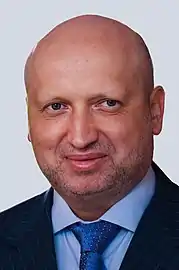
The first vice-prime minister, also known as the first deputy, heads the cabinet in the absence of the prime minister due to resignation or dismissal. Among the most notable First deputies were Yukhym Zvyahilsky and Mykola Azarov, who served as the acting prime minister for a longer period of time than anyone else. Valentyn Symonenko, Vasyl Durdynets, Oleksandr Turchynov and others also served as acting prime minister.
Apart from the first vice-prime minister, there are also several other vice-ministers who support the prime minister and may be in charge of one or more ministries. In 1991–1992 the office of the state minister was also introduced. Traditionally vice-prime ministers are in charge of an area of general state government policy such as the agro-industrial complex, humanitarian affairs, economic affairs, or regional policy. On certain occasions, those deputies may be given regular ministerial portfolios as well, as happened in the 2010 Azarov Government.
Dismissal and resignation
The prime minister, like other Cabinet members, may resign voluntarily by tendering their resignation to parliament (according to the Constitution of Ukraine, the prime minister can only be dismissed by parliamentary vote).[10][11] Parliament must then consider the matter no later than the 10th day after the resignation application is received, if parliament was not in session at the time of resignation then no later than the first plenary week of the next regular session.[12] A resignation by the prime minister results in the dismissal of the entire Cabinet.[12] After the adoption of the current constitution in 1996, only prime ministers Pavlo Lazarenko and Mykola Azarov have left their post this way.[13] Prime ministers do not have a set term limit, staying in office for the duration of the parliament term, resignation, or dismissal.
Before the constitutional reform of 2004, the prime minister was usually dismissed unilaterally by the president. After the reform, the prime minister can only be dismissed by the parliament.[11][12] Formally, the Verkhovna Rada needed to pass a resolution of no confidence of the cabinet, which had to result in the prime minister's resignation. However, the parliament could not put such a resolution to the vote within one year of the approval of the cabinet's official programme.[14] The Cabinets of prime ministers Viktor Yushchenko and Viktor Yanukovych were dismissed in this way, with the latter refusing to tender his resignation to the president claiming a violation of the one-year period condition. The Cabinet of Yuriy Yekhanurov had also been formally dismissed, but the parliamentary act was subsequently repealed.
List of prime ministers (1991–present)
Politics of Ukraine |
|---|
 |
|
Since Ukrainian independence from the Soviet Union in 1991, there have been 15 prime ministers[3] (19 including acting PMs). Yulia Tymoshenko was the first (and only) female prime minister of Ukraine. Before the re-appointment as Prime Minister of Mykola Azarov, Tymoshenko was the longest serving prime minister serving for two terms and a total of 1,029 days (days serving as acting prime minister are not included in these numbers).[15] Since Azarov was re-appointed as prime minister on 13 December 2012, he has since broken Tymoshenko's record.[16][17] Azarov resigned on 28 January 2014, due to public outcry and protests following the Euromaidan.[18] He was succeeded up by Arseniy Yatsenyuk on 27 February 2014.[19] Yatsenyuk announced he would resign as Prime Minister on 24 July 2014;[19] but his resignation was declined by parliament on 31 July 2014 when only 16 (of the 450) MPs voted for his resignation.[20][21]
Timeline

Parliamentary approval
| N | Date | Prime Minister | Origin | Political Party | Parliament votes | % (of 450) |
|---|---|---|---|---|---|---|
| 1 | November 14, 1990 | Vitold Fokin | Zaporizhzhia Oblast | Independent | 332 | 73.8 |
| 2 | October 13, 1992 | Leonid Kuchma | Chernihiv Oblast | Independent | 316 | 70.2 |
| 3 | June 16, 1994 | Vitaliy Masol | Chernihiv Oblast | Independent | 199 | 44.2 |
| 4 | March 6, 1995 | Yevhen Marchuk | Kirovohrad Oblast | Social Democratic Party of Ukraine | ??? | ??? |
| 5 | May 28, 1996 | Pavlo Lazarenko | Dnipropetrovsk Oblast | Hromada | ??? | ??? |
| 6 | July 16, 1997 | Valeriy Pustovoitenko | Mykolaiv Oblast | People's Democratic Party | 226 | 50.2 |
| 7 | December 22, 1999 | Viktor Yushchenko | Sumy Oblast | Independent | 296 | 65.8 |
| 8 | May 29, 2001 | Anatoliy Kinakh | Moldavian SSR | Industrialists | 239 | 53.1 |
| 9 | November 21, 2002 | Viktor Yanukovych | Donetsk Oblast | Party of Regions | 234 | 52.0 |
| 10 | February 4, 2005 | Yulia Tymoshenko | Dnipropetrovsk Oblast | Batkivshchyna | 373 | 82.9 |
| 11 | September 22, 2005 | Yuri Yekhanurov | Russian SFSR | Our Ukraine | 289[22] | 64.2 |
| 12 | August 4, 2006 | Viktor Yanukovych | Donetsk Oblast | Party of Regions | 271 | 60.2 |
| 13 | December 18, 2007 | Yulia Tymoshenko | Dnipropetrovsk Oblast | Batkivshchyna | 226[23] | 50.2 |
| 14 | March 11, 2010 | Mykola Azarov | Russian SFSR | Party of Regions | 242 | 53.8 |
| December 13, 2012 | 252 | 56.0 | ||||
| 15 | February 27, 2014 | Arseniy Yatsenyuk | Chernivtsi Oblast | Batkivshchyna | 371 | 82.2 |
| November 27, 2014 | People's Front | 341 | 75.8 | |||
| 16 | April 14, 2016 | Volodymyr Groysman | Vinnytsia Oblast | Petro Poroshenko Bloc | 257 | 57.1 |
| 17 | August 29, 2019 | Oleksiy Honcharuk | Chernihiv Oblast | Servant of the People | 290[24] | 64.4 |
| 18 | March 4, 2020 | Denys Shmyhal | Lviv Oblast | Independent | 291 | 64.7 |
Living former prime ministers
 Vitold Fokin
Vitold Fokin
(1991–1992)
25 October 1932.jpg.webp) Leonid Kuchma
Leonid Kuchma
(1992–1993)
9 August 1938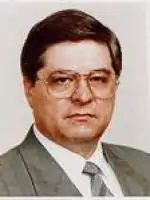 Pavlo Lazarenko
Pavlo Lazarenko
(1996–1997)
23 January 1953 Valeriy Pustovoitenko
Valeriy Pustovoitenko
(1997–1999)
23 February 1947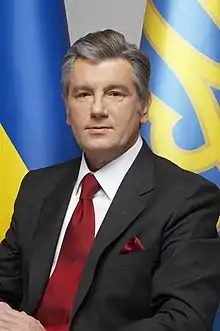
 Anatoliy Kinakh
Anatoliy Kinakh
(2001–2002)
4 August 1954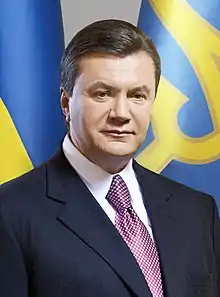
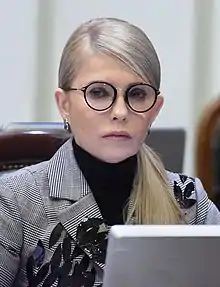
 Yuriy Yekhanurov
Yuriy Yekhanurov
(2005–2006)
23 August 1948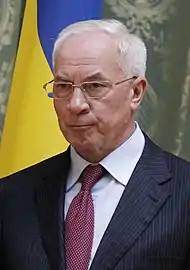 Mykola Azarov
Mykola Azarov
(2010–2014)
17 December 1947 Arseniy Yatsenyuk
Arseniy Yatsenyuk
(2014–2016)
22 May 1974 Volodymyr Groysman
Volodymyr Groysman
(2016–2019)
20 January 1978.jpg.webp) Oleksiy Honcharuk
Oleksiy Honcharuk
(2019–2020)
7 July 1984
References
- "Constitution of Ukraine". Verkhovna Rada of Ukraine. Retrieved May 25, 2019.
- Economic Interdependence in Ukrainian-Russian Relations by Paul J. D'Anieri, State University of New York Press, 1999, ISBN 978-0-7914-4246-3 (page 187)
- Eugenia Tymoshenko: the fight to save my mother Yulia, The Guardian (23 September 2012)
- Talant, Bermet (March 6, 2020). "Hasty government reshuffle sows disquiet at home, abroad". Kyiv Post.
- Ukrainian parliament appoints Yatseniuk prime minister, Interfax-Ukraine (27 November 2014)
- Government approves draft law on cabinet according to which president appoints premier, Interfax-Ukraine (October 5, 2010)
- "The salary of Yushchenko rose 9 times – to $4.5 thousand". NTA-Privolzhye. July 14, 2005. Archived from the original on October 3, 2011. Retrieved December 25, 2008.
- Azarov receives more than 30 thousands in a month (Азаров отримує більше 30 тисяч на місяць). Ukrayinska Pravda. 2013-1-24
- Help Me, Father Czar!, Kyiv Post (5 April 2012)
- Ukraine President Zelenskyy rejects PM's resignation, Al Jazeera English (17 January 2020)
- (in Ukrainian) "Keep me seven." What will end Goncharuk's "resignation", Glavcom (17 January 2020)
- (in Ukrainian) Honcharuk: The government continues to work until Zelensky makes a decision, Ukrayinska Pravda (17 January 2020)
- Laws of Ukraine. President of Ukraine decree No. 599/97: On the resignation of Prime Minister P.Lazarenko. Adopted on 1997-07-02. (Ukrainian)
- (in Ukrainian) Tymoshenko wants change of power: "Let them return to their 95s", Ukrayinska Pravda (16 January 2020)
- Azarov is record-holder in holding PM post Archived December 8, 2012, at the Wayback Machine, ForUm (4 December 2012)
- Ukraine parliament approves Azarov as prime minister, Reuters (13 December 2012)
- Azarov urges Ukrainians to be worthy of liberators' feat, Ukrinform (9 May 2013)
- BBC News (January 28, 2014). "Ukraine's PM Azarov and government resign". Retrieved January 28, 2014.
- Walker, Shaun (July 24, 2014), "Ukrainian prime minister Arseny Yatseniuk resigns", Guardian, retrieved July 24, 2014
Herszenhorn, David M. (July 24, 2014). "Ukraine Prime Minister Resigns, as Kiev Moves Toward Elections". New York Times. Retrieved July 24, 2014.
Rada speaker announces dissolution of parliamentary coalition, Interfax-Ukraine (24 July 2014)
Ukrainian PM Yatseniuk announces resignation in parliament, Interfax-Ukraine (24 July 2014)
Yatseniuk says collapse of Rada coalition means failure to pass laws on filling budget, Interfax-Ukraine (24 July 2014) - Rada expresses confidence in PM Yatseniuk, Interfax-Ukraine (31 July 2014)
- Yatseniuk's statement of resignation sent to parliament - Hroisman, Interfax-Ukraine (25 July 2014)
Koshulynsky closes parliament meeting, next one to take place on August 12, Interfax-Ukraine (25 July 2014) - Yekhanurov initially collected 223 votes out of the necessary 226, but he was appointed after the second try.
- Tymoshenko initially collected 225 votes out of the necessary 226. Some deputies announced that their votes did not correspond to the results. The Tymoshenko candidacy was approved on the second try.
- Ukrainian Lawmakers Approve Political Novice Honcharuk As Prime Minister, Radio Free Europe (29 August 2019)
External links
- "Official page of Prime Minister of Ukraine Arseniy Yatsenyuk" (in Ukrainian). Retrieved September 25, 2014.
- "Government portal". Cabinet of Ministers of Ukraine (in Ukrainian).